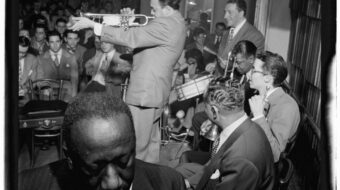
On Wednesday, May 11, one of my all time favorite Chicago hip-hop artists, Common, was featured at the White House after being invited by First Lady Michelle Obama to take part in an event celebrating poetry and music.
“I woke up with the sunshine, a sunshine I had never seen,” Common recited to a piano accompaniment during his spoken word. “There was light at the end of it, reminding me to forever dream. I was dreaming I walked into the White House with love on my sleeve and love for each and every one of you, reminding you to believe.”
Lonnie Rashid Lynn, Jr., known by his stage name Common, grew up on the south side of Chicago and came onto the hip-hop scene during the 1990s. He’s respected as a socially conscious rapper that has championed issues such as African American history, women’s rights, spiritualism, fatherhood, immigrant rights and local and national politics.
Despite Common’s notable record as one of hip hop’s most positive artists, conservative media pundits and Republican extremists deliberately used Common’s invitation by the White House to condemn the Obama administration.
“You know, the judgment, it’s just so lacking of class and decency and all that’s good about America with an invite like this,” said Sarah Palin on Fox News, adding that Common’s lyrics promote violence and cop killing.
Karl Rove, Rush Limbaugh, Fox News Anchor Sean Hannity and Glenn Beck joined Palin in criticizing Obama, arguing Common’s lyrics are un-American. He should have never been invited to the White House, they claim.
Wow, imagine that! Are we surprised? Can you picture the blatant racial connotations here? Let me clarify: Palin and company do not want the country’s first African American president to invite a black hip-hop artist to the White House on the grounds that he is un-American.
This whole scenario underscores the real ignorance about what African Americans, Latinos, women, minorities, working-class whites and others encountered during the darker days of this country’s racial past.
And it’s way too easy for Palin and others to brand Common’s music as anti-American and thuggish with lyrics that promote violence or cop killing. An attack on Common is really an attack on hip hop. But this type of expected right-wing rhetoric couldn’t be further from the truth.
Hip hop was born in the USA and transcends the power of traditional music. Its form of poetic lyricism has always been an urban narrative about racial, class and economic disparities that young people in cities nationwide encounter daily.
The hip-hop genre today has elements that are far and wide but its original explosion in the music industry, beginning in the 1980s, was the culmination of young black Americans expressing urban life, community and youth empowerment.
The rebellious tone throughout hip-hop’s evolution, similar to the history of rock and roll, jazz and blues, emphasized some form of struggle against poverty and racial injustice. It was only natural that hip hop music became another outlet for black youth to express angst against some form of real oppression.
Over the years, hip hop became a powerful medium, which is now celebrated and culturally accepted by millions of young people and supporters worldwide.
And despite the diversity in the hip-hop genre, especially its hardcore lyrics and images that glorify gangster life and even sexist attitudes, it’s the positive aspects of hip hop that continue to resonate with young people and is widely used as a force for liberation and education.
Many supporters on Common’s Facebook page note his positive influence and accomplishments in that respect.
One fan wrote, “Common, love and support all you do. Not just for the black community, but for all Americans who need to hear your words. Broaden their horizons and rise above the ignorance.”
Another wrote, “I am not hip hop’s greatest fan. I only listen to the ones who have something real to say. You have always been on that list and I can’t seem to remember Fox News ever being an expert or proficient in dissecting rhymes to get understanding. Fox needs to just stay in their lane. Common, you didn’t lose any supporters. Fox just did.”
After his White House debut Common responded to the right-wing hysteria, tweeting, “Politics is politics and everyone is entitled to their own opinion. I respect that. The one thing that shouldn’t be questioned is my support for the police officers and troops that protect us every day. Peace yall!”
I grew up listening to Common’s tracks. Here are some favorites. I encourage you to check these videos out:
– G. O. D.
Photo: This undated handout publicity photo provided by Geffen Records shows rapper Common. Michelle Obama’s “evening of poetry” at the White House set off Republican critics before the artists had uttered a word. But it was the inclusion of Common that set off Republicans. Common, who is considered fairly tame as rappers go, is known for rhymes that tend to be socially and politically conscious. (AP Photo/Cass Bird)

MOST POPULAR TODAY


Zionist organizations leading campaign to stop ceasefire resolutions in D.C. area

High Court essentially bans demonstrations, freedom of assembly in Deep South

Afghanistan’s socialist years: The promising future killed off by U.S. imperialism

Communist Karol Cariola elected president of Chile’s legislature






Comments